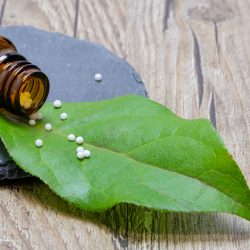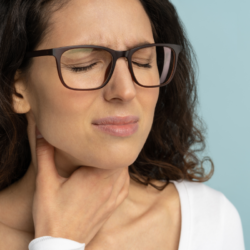Nasosinus polyps (leading to nasosinus polyposis) are benign growths that develop on the mucous membrane of the nasal cavities and sinuses. They can cause ventilatory problems (nasal obstruction, asthma) and superinfections. They evolve spontaneously over time, with a progressive increase in volume and chronic catarrh of the mucosa, suggesting a sycotic reaction. In fact, various factors (humidity, allergenic substances, etc.) are responsible for repetitive inflammatory or infectious flare-ups, which increase the symptoms. These flare-ups evolve either according to the sycotic reaction mode or the psoric reaction mode.
Homeopathic treatment will therefore include symptomatic medicines as well as field medicines (sycotic and psoric reaction mode medicines).
What is homeopathy?
Homeopathy is a form of alternative medicine based on the principle that substances which cause symptoms in healthy people can be used to treat the same symptoms in sick people. Homeopathic remedies are prepared from plants, minerals and other natural substances diluted in water or alcohol.
Homeopathic practitioners use a holistic approach to treating illness, taking into account the patient’s physical, emotional and mental symptoms. Homeopathic remedies are chosen on the basis of a patient’s overall symptoms rather than focusing solely on the main symptom.
How can homeopathy help in the treatment of nasosinus polyposis?
Nasosinus polyposis can be treated with homeopathic remedies that can relieve symptoms such as nasal congestion, headaches, loss of smell and pain. Homeopathic remedies can help reduce inflammation of the sinus mucosa and prevent the growth of polyps. Homeopathy can also be used to complement conventional medical or surgical treatment for nasosinus polyposis.
How do I take homeopathic remedies?
Homeopathic remedies are generally taken in the form of granules or drops, which are placed under the tongue or diluted in water. Homeopathic remedies are generally taken outside of mealtimes for better absorption. However, it is important to follow the manufacturer’s or homeopath’s instructions for taking the appropriate remedy.
Symptomatic medicines for nasosinus polyposis
Symptomatic medicines are often used to relieve the symptoms of nasosinusal polyposis. Although they do not treat the underlying cause of the polyps, they can help reduce inflammation, nasal congestion and other troublesome symptoms. In this part of the article, we will explore the different symptomatic medications that can be used to treat nasosinus polyposis.
Teucrium marum :
This homeopathic remedy should be routinely prescribed in all polypoid formations. Nasal sensation worsens, particularly in the heat of the bed and in hot weather. There is pruritus of the mucosa, sneezing and aqueous rhinorrhoea which is aggravated by dampness. Sometimes the rhinorrhoea is mucopurulent with a posterior discharge, forcing the patient to sniff mucus.
Dosage: Take 5CH, 5 granules 2 times a day.
Sanguinaria canadensis :
This medicine is recommended for polyposis accompanied by severe vasomotor phenomena with rhinitis and rhinorrhoea that excoriates the nostrils, alternating with a sensation of nasal dryness. There are also episodes of anosmia, nocturnal dry cough and epistaxis.
Recommended dosage: Take 5CH, 5 granules 2 times a day.
Sanguinaria nitrica :
This medicine is recommended for respiratory problems caused by nasosinus polyposis: sinusitis, spasmodic coryza, asthma, etc.
Dosage: Take 5CH, 5 granules 2 times a day.
Sanguinaria nitrica is a homeopathic remedy often used in the following cases:
- Migraines and headaches: Particularly effective for migraines that occur periodically, often linked to hormonal or environmental changes.
- Respiratory disorders: Used to relieve the symptoms of sinusitis, particularly congestion and pain.
- Skin problems: May be indicated for certain types of skin conditions, such as red, itchy rashes.
- Joint pain: Effective for joint pain, particularly pain that worsens with movement.
- Digestive disorders : Helps relieve symptoms of gastric acidity and abdominal pain.
- Menopausal symptoms: Can be used to reduce hot flushes and hormonal imbalances in menopausal women.
Phosphorus :
Its indication is effectively based on polyps that cause nasal obstruction with laryngeal cough and epistaxis.
Dosage: Take in 9CH, 5 granules once or twice a day.
The homeopathic remedy Phosphorus is frequently used in the following cases:
- Respiratory problems: Effective in treating symptoms of bronchitis, pneumonia and asthma, especially when accompanied by a dry, painful cough.
- Bleeding : Indicated for various types of bleeding, such as nosebleeds, gastrointestinal bleeding, or heavy menstruation.
- Nervous disorders: Useful for people suffering from anxiety, inexplicable fears or nervous exhaustion.
- Digestive disorders: Used to relieve nausea, vomiting and heartburn, especially when these symptoms worsen after eating or drinking cold food.
- Liver problems: May be used for liver conditions, including hepatitis and liver congestion.
- General weakness: Recommended for people suffering from general weakness, lack of energy or extreme fatigue.
- Emotional sensitivity: Effective for people who are hypersensitive to external impressions, sounds, smells or light.
Apis mellifica :
It is the pale oedema of the mucous membrane with the improvement by the freshness which justifies however the taking of the medicine when one meets this symptom and its modality in a patient suffering from polyposis.
Dosage: Take 9 or 15CH, 5 granules one or more times a day.
Apis mellifica is a homeopathic remedy often used in the following cases :
- Allergic reactions: Effective for allergic reactions with swelling, redness and itching, such as insect bites.
- Oedema: Used for swelling due to fluid accumulation, often with a burning sensation and improvement on contact with cold.
- Skin problems: Indicated for red, swollen, itchy skin eruptions, such as hives.
- Urinary problems: Used in cases of cystitis or urinary infections, with burning during urination.
- Conjunctivitis: Effective for conjunctivitis with redness, swelling and itching of the eyes.
- Joint pain: Used for joint pain that improves with movement and the application of cold compresses.
- Inflamed throat: Indicated for sore throats with swelling, pain and difficulty swallowing.
Sycotic reaction mode medicines for nasosinusal polyposis
These medicines should therefore be taken in the presence of their characteristic signs. In this article, we will only specify a few specific criteria for each of them.
Thuja occidentalis :
Taken systematically, its indication is reinforced when the patient has received repeated corticosteroid therapy.
Dosage: Take in 9, 15 or 30CH, from 5 daily granules to a weekly dose.
Natrum sulphuricum :
This homeopathic remedy is indicated when there is simultaneous mucous or mucopurulent rhinorrhoea and bronchorrhoea triggered or aggravated by wet weather.
Dosage: Take in 9, 15 or 30CH doses, from 5 daily granules to a weekly dose.
Silicea :
Silicea is indicated when polyposis is complicated by chronic or recurrent suppurative phenomena.
Dosage: Take in high dilutions, from 5 daily granules to a weekly dose.
Medorrhinum :
This biotherapeutic treatment of the sycotic reaction mode is indicated in particularly intractable forms.
Dosage: Take 15CH, one or 2 monthly doses.
The homeopathic remedy Medorrhinum is often used in the following cases:
- Urogenital disorders: Indicated for chronic urinary infections, cystitis, and certain disorders related to the genital sphere.
- Joint pain: Used for intense joint pain and stiffness, particularly those that improve with heat and humidity.
- Behavioural disorders: Effective for behavioural disorders such as hyperactivity, impulsivity or excessive anxiety.
- Skin conditions: Used in the treatment of certain skin conditions, such as eczema or acne, especially when they are chronic or recurrent.
- Menstrual disorders: Indicated for menstruation that is irregular, painful or accompanied by marked premenstrual symptoms.
- Fatigue-related symptoms: Used to treat chronic fatigue, lack of energy and insomnia.
- Respiratory problems: May be effective for chronic respiratory problems such as asthma, especially when accompanied by a feeling of tightness.
The main psoric-reaction medications for nasosinusal polyposis
Calcarea carbonica :
This homeopathic medicine is also indicated for nasosinusal polyposis regardless of the patient’s morphology.
Dosage: Take in 9 or 30CH, one dose per week.
Calcarea carbonica is a homeopathic remedy commonly used in the following situations:
- Growth problems in children: Used for children with growth problems, such as stunted growth or dental difficulties.
- Bone and joint disorders: Indicated for joint pain, slow-healing fractures and osteoporosis.
- Digestive problems: Effective against indigestion, heartburn and constipation, particularly in people with slow digestion.
- Menstrual disorders: Used for irregular, heavy or painful periods.
- Anxiety and fear: Helps relieve anxiety, particularly fear of failure or illness.
- Fatigue and exhaustion: Recommended for people who feel tired, exhausted or overwhelmed, often with an excessive need for sleep.
- Skin problems: Effective for certain types of skin problems, such as eczema or warts.
Natrum muriaticum :
Its indication is based on the association of polyps with respiratory manifestations (rhinitis, asthma…) and essentially sensitive type criteria.
Dosage: Take as 9, 15 or 30CH; from 5 daily granules to a weekly dose.
What are the side effects of homeopathic remedies?
Homeopathic remedies are generally considered safe and have few side effects. However, some people may experience a slight worsening of symptoms before improvement occurs. If you experience severe or persistent side effects, consult a healthcare professional immediately.
- Calcarea carbonica: used for people with chronic nasal polyps who feel cold and tend to sweat.
- Kali bichromicum: used for nasal polyps accompanied by pain and pressure in the frontal sinuses.
- Pulsatilla: used for nasal polyps with a sensation of heat and nasal congestion.
It is important to consult a homeopath to determine the appropriate homeopathic remedy for your specific symptoms.
How do I take homeopathic remedies?
Homeopathic remedies are generally taken in the form of granules or drops, which are placed under the tongue or diluted in water. Homeopathic remedies are generally taken outside of mealtimes for better absorption.
It is important to follow the manufacturer’s or homeopath’s instructions for taking the appropriate remedy.
What are the side effects of homeopathic remedies?
Homeopathic remedies are generally considered safe and have few side effects. However, some people may experience a slight worsening of symptoms before improvement occurs. If you experience severe or persistent side effects, consult a healthcare professional immediately.
When should you consult a homeopath?
It is recommended that you consult a homeopath if you are looking to use homeopathy to treat nasosinus polyposis. A homeopath can help you choose the right remedy for your specific symptoms and monitor your treatment.
What are the advantages and disadvantages of homeopathy for nasosinus polyposis?
The advantages of homeopathy for nasosinus polyposis include the possibility of using natural treatments, a holistic approach to treating symptoms, and the possibility of reducing the side effects associated with conventional medical treatments.
However, homeopathy may not be suitable for everyone and cannot replace conventional medical or surgical treatment for severe cases of nasosinus polyposis.
How can nasosinus polyposis be prevented?
Although there is no sure way of preventing nasosinusal polyposis, it is possible to reduce the risk of developing the condition. Preventive measures can include:
- Avoiding irritants such as cigarette smoke and chemicals.
- Treating respiratory infections promptly.
- Using humidifiers to maintain adequate humidity in the air.





